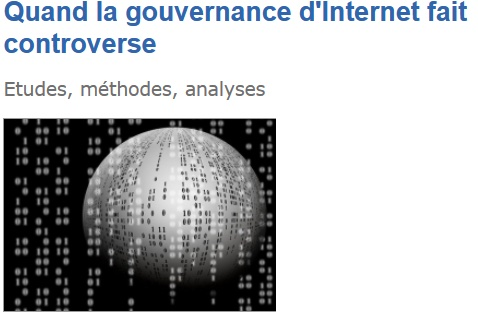This issue of Terminal magazine, dedicated to the challenges of blockchains, coordinated by Primavera De Filippi, Chantal Enguehard, David Fayon, Anne Gagnebien and Geneviève Vidal, brings together analyses from several disciplines: sociology, law, political science, management science, information and communication science, art history and computer science.
Dominique Desbois looks back at the genesis of a "cyberpunk utopia" and its hijacking by captains of the digital industry, often militant "libertarians". "While this anarcho-capitalist political orientation remains in the minority in the USA, it is strongly represented in certain business circles: according to a recent survey, 44% of Bitcoin holders would define themselves as libertarians".
Philémon Poux, Primavera De Filippi and Bruno Deffains discuss certain practices in the blockchain world (notably those of Maximal Extractable Value-MEV) that take advantage of another user's efforts to identify a profitable transaction and capture its value. " These MEVs reduce trust in the network". While non-cooperative game theory is unable, according to the authors, to prevent unfair MEVs, " cooperative game theory, in the context of commons, can shed light on the situation, characterizing public blockchain networks as common pool resources".
Computer science researcher Pablo Rauzy presents the technical and IT concepts behind blockchains, such as decentralization, distribution, immutability and consensus, as well as the technical operation of underlying cryptographic tools such as condensates, signatures, proof of work and proof of stake. Aspects such as the non-neutrality of blockchains inherited from libertarian ideology are also examined. Three use cases are discussed: cryptocurrencies, document certification and NFTs (Non-Fungible Tokens).
For sociologist Cécile Caron, "blockchains present themselves as trusted technologies, offering secure peer-to-peer exchanges without intermediaries. But they present risks for privacy and raise questions about regulatory compliance". The analysis of a use case shows the socio-technical compromises made by blockchain players, particularly in considering blockchain technology as a "privacy solution".
Lawyer Sofia Roumentcheva, for her part, approaches blockchains as a collaborative innovation, presenting issues relating to the intellectual property of new innovation modalities. The traceability of contributions and the imbalance in the sharing of value are of particular interest to the author, who questions blockchains as a technical tool that complies with legal requirements.
The second part of the dossier is organized around three blockchain use cases: bitcoin, cinema and music.
Éric Arrivé, for his part, proposes an understanding of the bitcoin protocol "as a socio-technical hybrid ", going beyond the study of actors and interest groups. The expansion of the bitcoin protocol relies on the computing power offered by blockchains. The main result of this analysis is the modelling of the bitcoin protocol as a two-sided system, whose entanglement produces a spring that is characteristic of its expansion, not in terms of uses, but in terms of computing power. It is likely to be used in the future by a variety of disciplines to better assess the risks involved.
Katia Andrea Morales Gaitan looks at innovations in business models linked to intellectual property management carried out with blockchain platforms in the film and audiovisual industry. She examines the precariousness and elitism of new filmmakers, as well as competition and changes in audience behavior that are now more akin to amateur production and remix culture than to the creation of original content.
Régis Barondeau, Charlotte Blanche and Simon Delage examine how the music industry has embraced blockchain in a wide range of applications, from audience relations and rights management to new creative possibilities. Examining the specific case of the Quebec music industry, the authors discuss their findings in the light of the knowledge commons, with the support of a scenario for the creation of a distributed metadata registry self-governed by industry players.
Contents
Dominique Desbois: Blockchain: from cyberpunk utopia to environmental constraints. The need for regulation
Blockchains: what are the legal, economic and energy issues?
- Primavera De Filippi, Chantal Enguehard, David Fayon, Anne Gagnebien, and Geneviève Vidal: Introduction: Some security, legal, economic, and energy issues of blockchains."
- Primavera De Filippi and David Fayon: Blockchains, new tools for economic, social and political transformation. State of the art
- Primavera de Filippi, Bruno Deffains and Philémon Poux: "Maximal Extractable Value" or the Tragedy of Blockchains as Commons[.
- Pablo Rauzy: Promises and (dis)illusions. A technocritical introduction to blockchains
- A technocritical introduction to blockchains
- Cécile Caron: Blockchain put to the test of privacy. Sociotechnical trade-offs between two models of trust in the design and experimentation of a mobility service.
- Sofia Roumentcheva. Uses of blockchain in collaborative innovation. Issues in intellectual property law
Applications and case studies
- Éric Arrivé: Heads and tails. The two interlinked socio-technical configurations of the Bitcoin protocol
- Katia Andrea Morales Gaitán: Blockchain adoption in cinema. The missing link in the independent cinema value chain?
- Régis Barondeau, Charlotte Blanche and Simon Delage: Blockchains and the commons to the rescue of the cultural exception?
Référence :








